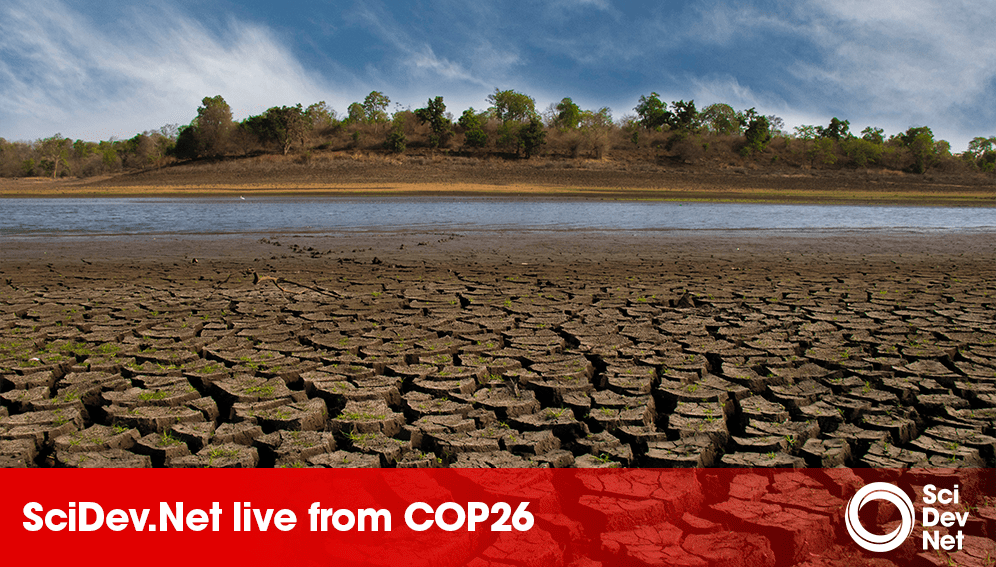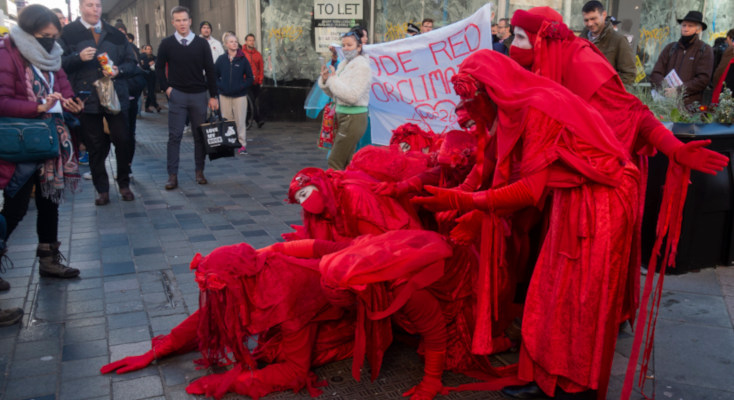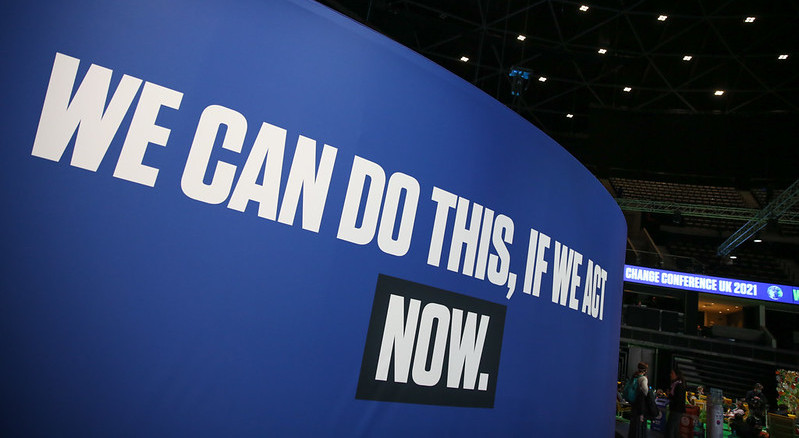By: Ruth Douglas, Fiona Broom and Aleida Rueda
Send to a friend
The details you provide on this page will not be used to send unsolicited email, and will not be sold to a 3rd party. See privacy policy.
This liveblog is supported by funding from the Global Landscapes Forum (GLF)
![]()
12 November 2:00pm
Live updates on the best science and development news from the COP26 climate talks in Glasgow, UK.
COP26 negotiations are officially due to come to a close this evening – but they will likely carry over into Saturday.
In a sign of the complexity of the issues that are still being discussed, some observers have even suggested the final texts from the UN climate summit may not be delivered until Sunday.
This will be the final post in our live blog from host city Glasgow, but we’ll have more news online at SciDev.Net on Monday.
A second draft of the cover decisions was released this morning. The cover decisions are the summit’s final agreements relating to the climate change convention, the Paris Agreement and the Kyoto Protocol.
Advocates for vulnerable countries and the global South are quietly optimistic about some of the progress in the agreements, particularly relating to the clearer detail on how the Santiago Network for loss and damage will become a reality.
The updated text is being described as “more balanced” than the first draft put out two days ago. ‘Balance’ refers to the desires of developing and developed countries, which have not always aligned here at COP26.
Climate finance has been a major sticking point in negotiations, as climate-vulnerable countries have made it clear that this a red line issue for them. Long-term financing for adaptation and mitigation, and for loss and damage, is still being negotiated, according to summit president Alok Sharma.
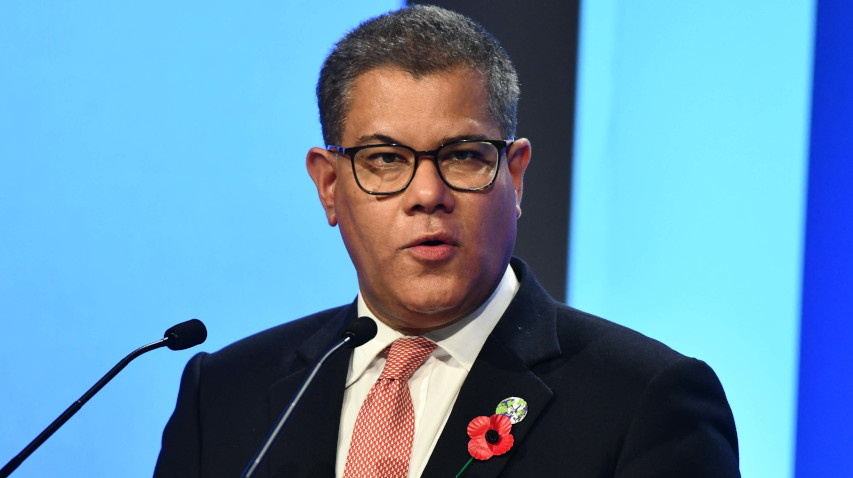


Alok Sharma at Exploring Loss and Damage at Cop 26 on the 8th November 2021 at the SEC,Glasgow. Copyright: Justin Goff/UK Government, (CC BY-NC-ND 2.0).
Yamide Dagnet from the global research non-profit World Resources Institute (WRI) highlighted the delicacy of these negotiations: “The challenge is to maintain what we know is fragile because of the politics,” said Dagnet, who leads on climate negotiations.
“Some of those elements are already the result of a very delicate balance and we know that the politics are still hard. The next 24 hours are going to be absolutely crucial.
“Some negotiators came to fight it all, vulnerable countries put all their energy to really fight for their survival and we’ll see how much of this prevails. But there’s already been progress.”
Emergency pact
More than 650 civil society groups and individuals have signed an open letter to delegation heads calling for the adoption of the Glasgow Emergency Pact to reignite the goal of limiting global temperature rise to 1.5 degrees Celsius.
“Glasgow needs to deliver an ‘emergency pact’ to restore confidence in international climate cooperation for keeping 1.5C alive, to accelerate adaptation, address mounting loss and damage, and ensure promised finance is delivered,” said Abul Kalam Azad, Bangladesh’s special envoy for the 55-nation Climate Vulnerable Forum (CVF), which advocates for countries in the global South most at risk from the impacts of climate change.
The pact calls for developed countries to come up with a delivery plan for the US$500 billion promised between 2020 and 2024. Wealthy nations pledged $100 billion a year from 2020 at the 2009 Copenhagen summit to help vulnerable countries adapt to climate change, but the funding remains elusive.
Loss and damage
Yesterday Scotland said it would double its promised funding for climate loss and damage. At the opening of COP26, the host country pledged £1 million (US$1.36 million) for loss and damage, supporting a partnership with the US-based Climate Justice Resilience Fund to help communities rebuild from climate-related events.
The Scottish Government now says that it will deliver £2 million for loss and damage. “If Scotland can up its contribution, there is no good reason why the larger, developed countries around the negotiating table cannot do so too,” said Scottish first minister Nicola Sturgeon.



Scotland’s First Minister Nicola Sturgeon meeting the Prime Minister of Palestine Dr. Mohammad Shtayyeh during COP26. Copyright: Scottish Government, (CC BY 2.0).
She said the government would increase its Climate Justice Fund to £36 million, from £24 million. “It is clear that fair climate finance is the key to making real progress at COP26,” Sturgeon said.
“Every vulnerable or developing country I have spoken with has big ambitions for meeting the climate crisis but they do not have the funding for adaptation, for mitigation, or for tackling the loss and damage that is needed to deliver.
“Twelve years on from the commitment by developed nations to provide funding of US$100 billion a year, that is simply not good enough.”
![]()
![]()
![]()
![]()
![]()
![]()
![]()
![]()
![]()
![]()
![]()
![]()
![]()
![]()
![]()
![]()
![]()
![]()
![]()
![]()
![]()
![]()
![]()
![]()
![]()
![]()
![]()
![]()
![]()
![]()
![]()
![]()
![]()
![]()
![]()
12 November 9:30am
Live updates on the best science and development news from the COP26 climate talks in Glasgow, UK.
An alliance of state and regional governments committed to ending new licensing rounds for oil and gas production and exploration has been launched at COP26.
The Beyond Oil and Gas Alliance (BOGA) has largely drawn widespread applause – a rare event here at COP26, where most announcements have been met with divided opinion. Security had to turn people away as crowds swelled outside the press conference room ahead of the announcement.
It is time to heed the science and end oil and gas production and exploration, ministers said at the launch, as they touted their focus on restricting fossil fuel supply rather than targeting demand.
The alliance offers a tiered system of membership, with core members pledging to end new concessions, licensing or leasing rounds for oil and gas production and exploration. Core members also commit to set a Paris Agreement-aligned date for ending oil and gas production and exploration in their territories.
These states include leading members Costa Rica and Denmark, with France, Greenland, Sweden and Quebec.
Associate members – including California, New Zealand and Portugal – and ‘friends’ are jurisdictions that are considered to be on the path to reducing oil and gas production, and will be able to graduate to premium membership as their policies progress.
Costa Rica’s environment and energy minister, Andrea Meza Murillo, said: “We are hearing the world outside these walls and we know that science is clear. We really need to accelerate action.”
However, the alliance does not include any of the top 30 oil and gas producing countries, such as the US and China, Saudi Arabia, Brazil and COP26 president UK.
BOGA said it was in talks with other countries, but declined to name any except COP26 hosts Scotland, whose waters contain most of the UK’s largest oil fields.
Eamon Ryan, the environment minister for Ireland, a core BOGA member, said the alliance was setting an example for other governments to follow.
“For too long, we’ve put all the pressure on the consumer – ‘Have you done the right thing? Is that the right lightbulb?’ Instead, we’ve struck the problem at the source, at the mine head, at the well head, at the gas pipeline,” Ryan said.
Tim Whyte, ActionAid Denmark secretary general, said: “Joining an alliance like BOGA is the test ground for whether governments are seriously moving away from the deadly path we are on or whether all the promises we hear at the COP26 are yet again greenwashíng of continued expansion of oil and gas.
“It is also the test ground for the success of the summit to keep the 1.5 degrees Celsius goal alive.
“To meet this target, countries need to stop licensing new oil and gas fields and countries in the global North should support a just transition in the global South.”
International environmental movement 350.org said BOGA members must continue to work to bring other governments on board, and create support mechanisms for global South countries.
![]()
![]()
![]()
![]()
![]()
![]()
![]()
![]()
![]()
![]()
![]()
![]()
![]()
![]()
![]()
![]()
![]()
![]()
![]()
![]()
![]()
![]()
![]()
![]()
![]()
![]()
![]()
![]()
![]()
![]()
![]()
![]()
![]()
![]()
![]()
11 November 10:30am
Live updates on the best science and development news from the COP26 climate talks in Glasgow, UK.
The last of the COP presidency events will focus on cities, regions and built environments. A special closing meeting today (Thursday) will see Ugandan climate activist Vanessa Nakate and Scotland’s first minister Nicola Sturgeon discuss how cities, businesses and investors can accelerate climate action.
A new partnership between the US and China took some by surprise yesterday. The two countries announced a joint declaration on enhancing climate action, which includes detail relating to methane emissions and a climate action working group.
Manish Bapna, president and chief executive at the US-based Natural Resources Defense Council, said the announcement that the US and China agreed to accelerate climate action and ambition in this decisive decade was “good news”.
“The pledge to strengthen cooperation on clean energy, methane, and deforestation from the two largest economies and greenhouse gas emitters is a welcome step forward,” said Bapna.
“But if we are to hold global warming to 1.5 degrees Celsius, we urgently need to see commitments to cooperate translate into bolder climate targets and credible delivery.”
And with yesterday’s theme focused on transport, 18 countries launched the Clydebank Declaration, which aims to establish at least six ‘green’ shipping corridors by the middle of this decade. Signatories include Morocco, Costa Rica and Chile, as well as the US, the UK and Australia.
Shipping contributes about three per cent of global greenhouse gas emissions. The International Maritime Organization adopted a climate strategy in 2018 to reduce total annual emissions by at least 50 per cent by 2050, compared to 2008.
The declaration will require the development of zero emissions fuels, regulatory frameworks, and infrastructure to support decarbonisation.
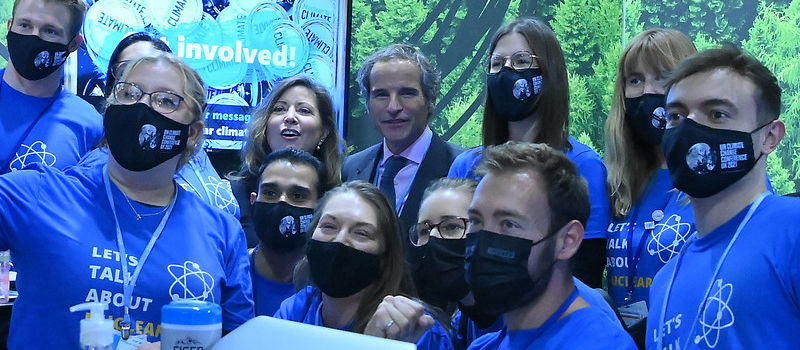


When IAEA director general Rafael Mariano Grossi (centre) with members of the Young Nuclear Group at the COP26. Copyright: IAEA, (CC BY 2.0).
![]()
![]()
![]()
![]()
![]()
![]()
![]()
![]()
![]()
![]()
![]()
![]()
![]()
![]()
![]()
![]()
![]()
![]()
![]()
![]()
![]()
![]()
![]()
![]()
![]()
![]()
![]()
![]()
![]()
![]()
![]()
![]()
![]()
![]()
![]()
10 November 9:30am
Live updates on the best science and development news from the COP26 climate talks in Glasgow, UK.
Country negotiators will continue work over the next couple of days to finalise the text of the ‘cover decision’ — the headline message from a UN climate summit that should outline actions to meet pledges — with the first draft text coming out overnight.
COP26 chair Alok Sharma said negotiators still had “a mountain to climb” to reach a deal that will limit global warming to 1.5 degrees Celsius.
Elsewhere, talks will change tack today to focus on transport and achieving zero emissions transportation systems.
Cars, the aviation and shipping industries are major global polluters, accounting for 24 per cent of total energy-related carbon emissions, according to the International Energy Agency (IEA). And despite more fuel-efficient vehicles technologies and related policy adoptions, greenhouse gas emissions have continued to increase.
Transport demand per capita in developing and emerging economies has been projected to increase rapidly in the coming decades, with rising incomes and infrastructure development. But the IEA says that global transport emissions increased by less than 0.5 per cent in 2019, compared with 1.9 per cent annually since 2000, due to efficiency improvements, electrification and greater use of biofuels.
With yesterday’s focus on gender, Bolivia committed to reflect gender data in its national climate strategies and promote the leadership of women and girls — particularly indigenous, Afro-Bolivian, and rural women.
Nigeria committed to expand on its implementation strategy for the National Gender and Climate Action Plan, while Ecuador said it would strengthen leadership, negotiation and decision-making capacities within women’s organisations working on climate. These commitments fall under the Feminist Action for Climate Justice Coalition, a multi-stakeholder partnership for governments, civil society, philanthropy and the private sector.
Women and girls are leading #ClimateAction movements around the world. Their voices count and must be heard and acted upon. #COP26
— Amina J Mohammed (@AminaJMohammed) November 9, 2021
And a slew of financial pledges were made yesterday to the Least Developed Countries Fund (LDCF), hosted by the Global Environment Facility (GEF). Twelve countries, including Sweden, France and Belgium, pledged US$413 million in “new funding”.
Sonam Phuntsho Wangdi, chair of the Least Developed Countries Group at COP26, said: “The LDCF has a special place in the hearts of least developed countries, as it is the only climate change adaptation fund that is designed to meet our unique needs and priorities.
“We are 46 of the world’s most vulnerable countries, and the science indicates that our climate risk exposure will only increase. Support from the LDCF enables us to take action and prepare for trouble ahead.”
Prioritizing #LossAndDamage & #Adaptation remains top concern for the world’s vulnerable countries, who suffer the most from the impacts of #ClimateChange while bearing the least responsibility. We must see world leaders at #COP26 urgently increase #ClimateFinance for each.
— LDC Chair (@LDCChairUNFCCC) November 8, 2021
GEF chief Carlos Manuel Rodriguez said the pledges would “make an immediate difference in the places where climate change risks are most acute”.
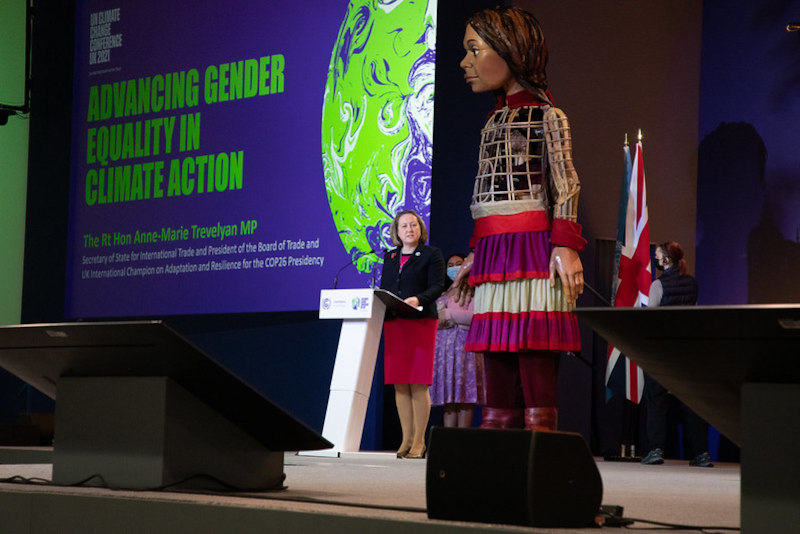


This 3.5 meters tall puppet, called ‘Little Amal’, represents a ten-year-old Syrian refugee girl who has travelled 8,000 kilometres on foot from the Syrian border to Manchester, UK over a period of four months in the lead-up to COP26. Here she was attentively behind MP Anne Marie Trevelyan at the Advancing Gender Equality in Climate Action event. Copyright: Will Crowne/UK Government, (CC BY-NC-ND 2.0).
![]()
![]()
![]()
![]()
![]()
![]()
![]()
![]()
![]()
![]()
![]()
![]()
![]()
![]()
![]()
![]()
![]()
![]()
![]()
![]()
![]()
![]()
![]()
![]()
![]()
![]()
![]()
![]()
![]()
![]()
![]()
![]()
![]()
![]()
![]()
9 November 3:30pm
Live updates on the best science and development news from the COP26 climate talks in Glasgow, UK.
Science has been the buzzword of the day at events across COP26.
Climate scientists discussed the latest Intergovernmental Panel on Climate Change (IPCC) report – dubbed the ‘code red for humanity’ report – and the responses and action that will be needed to respond to the findings, which will form the physical science basis of the IPCC’s sixth assessment.
Gonzalo Muñoz, a COP25 high-level champion who was nominated by the Chilean presidency to mobilise climate action among non-state actors around the world, said the report was released in the middle of a pandemic, while science was being strengthened around the world.
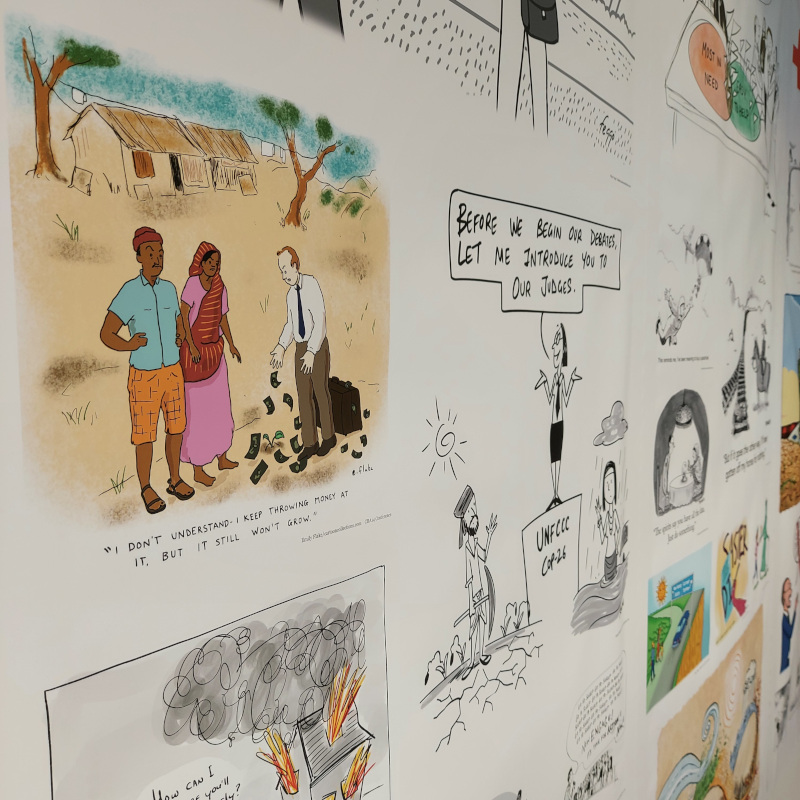


Some of the cartoons on the Cartoons for Climate Risks gallery, which aims to harness humour for climate risk management, by identifying what is absurd and unacceptable. Copyright: Fiona Broom/SciDev.Net
“We’ve seen the failures of leaders who do not follow science,” Muñoz said. “That context means a lot.”
Pasang Dolma Sherpa, the executive director of the Center for Indigenous Peoples’ Research and Development, said that Nepal’s mountain regions were turning from white to black, an indication that climate change was already hitting the cryosphere.
But she said that the ‘code red for humanity’ report failed to consider the value of indigenous knowledge, while the summary for policymakers – one of the most widely disseminated documents – did not mention indigenous peoples at all.
Meanwhile, Climate Action Tracker (CAT) has released its much-anticipated annual global update, which is scathing of pledges to reach net zero greenhouse gas emissions.
“Glasgow has a massive credibility, action and commitment gap as the world is heading to at least 2.4 degrees Celsius of warming, if not more,” warned CAT, an alliance of independent scientific bodies.
The analysis says that with all target pledges, including those made in Glasgow, global greenhouse gas emissions in 2030 will still be around twice as high as necessary for the 1.5 degrees Celsius limit.
Governments must focus on closing the “credibility gap” by phasing out the use of coal and increasing climate finance, which is essential for many developing countries, CAT urged.
Bill Hare, the head of CAT partner organisation Climate Analytics, said: “Coal must be out of the power sector by 2030 in the OECD [Organisation for Economic Co-operation and Development], and globally by 2040, and in spite of political momentum and the clear benefits beyond climate change mitigation, there is still a huge amount of coal in the pipeline.”
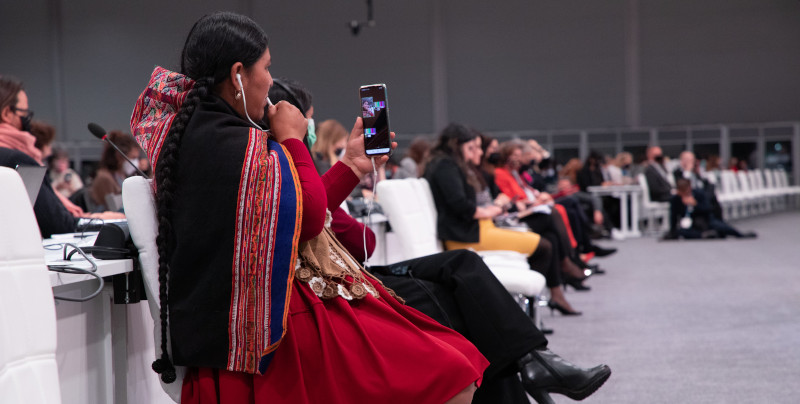


Audience members listen to speakers at the Advancing Gender Equality in Climate Action event. Copyright: Will Crowne/UK Government, (CC BY-NC-ND 2.0).
![]()
![]()
![]()
![]()
![]()
![]()
![]()
![]()
![]()
![]()
![]()
![]()
![]()
![]()
![]()
![]()
![]()
![]()
![]()
![]()
![]()
![]()
![]()
![]()
![]()
![]()
![]()
![]()
![]()
![]()
![]()
![]()
![]()
![]()
![]()
9 November 9:30am
Live updates on the best science and development news from the COP26 climate talks in Glasgow, UK.
COP26 will turn its attention to gender today, with a focus on including women and girls in climate action, as the high-level segment of proceedings resumes.
On the sidelines of the conference, a number of science and innovation events will highlight how science can deliver solutions to drive greater climate ambition.
However, on a day dedicated to progressing gender equality, we will again see limited representation of women at the government level, with less than one in four speakers at the high-level segment carrying the title “Her excellency”.
As this segment resumes, there will be further national statements from environment, climate, energy and other ministers of countries whose leaders did not address the summit last week.
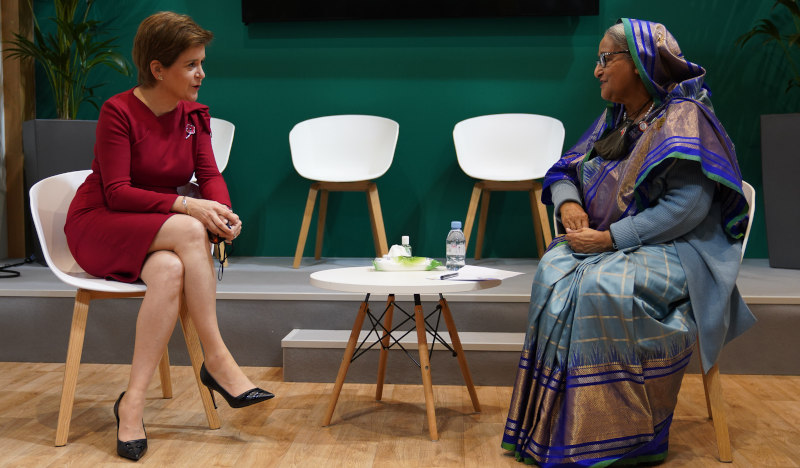


Scottish First Minister Nicola Sturgeon met with Bangladesh Prime Minister Sheikh Hasina following the Women’s Climate Leadership Event last week at COP26. Copyright: Scottish Government, (CC BY 2.0).
Speakers today will include Guinea’s lead negotiator, Ahmadou Sebory Toure. He will be speaking on behalf of the Group of 77 – a coalition of 134 developing countries that work together to promote their economic interests – and China.
And Wera Mori, Papua New Guinea’s minister for environment, conservation and climate change, will speak on behalf of the Coalition for Rainforest Nations.
Climate and health will also be up for discussion. A group of 47 countries has committed to developing climate-resilient and low-carbon health systems, in response to growing evidence of the impact of climate change on people’s health, the World Health Organization (WHO) announced late Monday.
Countries that have signed on to achieve low-carbon, sustainable health systems include Argentina, Fiji and Malawi, while countries including Bangladesh and Ethiopia committed to enhance the climate resilience of their health systems, as part of the COP26 Health Programme.
WHO chief Tedros Adhanom Ghebreyesus said: “The future of health must be built on health systems that are resilient to the impacts of epidemics, pandemics and other emergencies, but also to the impacts of climate change, including extreme weather events and the increasing burden of various diseases related to air pollution and our warming planet.
“Health systems must also be part of the solution, by reducing carbon emissions.”
Key players in the fashion industry yesterday updated their emissions reductions targets under the existing Fashion Industry Charter for Climate Action. The 130 companies that are signatory to the charter will commit to either set science-based emissions reductions targets or halve their emissions by 2030, with a pledge to achieve net zero emissions no later than 2050.
The companies – including fast fashion brands H&M and Primark, as well as luxury brand Burberry, which has been criticised for burning unsold stock – also commit to quantify, track and publicly report their greenhouse gas emissions. Following an outcry in 2018, Burberry said it would stop the practice of destroying returned goods and increase efforts to recycle or repair them.
![]()
![]()
![]()
![]()
![]()
![]()
![]()
![]()
![]()
![]()
![]()
![]()
![]()
![]()
![]()
![]()
![]()
![]()
![]()
![]()
![]()
![]()
![]()
![]()
![]()
![]()
![]()
![]()
![]()
![]()
![]()
![]()
![]()
![]()
![]()
8 November 3:30pm
Live updates on the best science and development news from the COP26 climate talks in Glasgow, UK.
Former US president Barack Obama addressed hundreds of delegates in Glasgow today, telling them “We’re nowhere near where we need to be”.
“For starters, despite the progress that Paris represented, most countries have failed to meet the action plans that they set six years ago,” he told the packed COP26 conference hall, adding that the 2015 Paris Agreement was meant to be a “starting point”, not the end point.
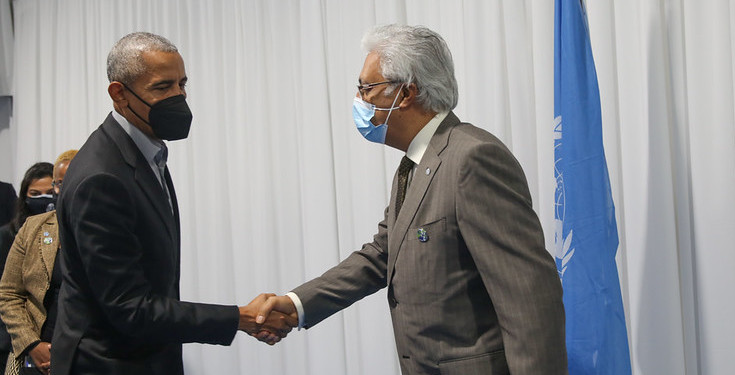


Former US president Barack Obama (left) shortly before he addressed the delegates. Copyright: UNclimatechange, (CC BY-NC-SA 2.0).
He said the failure to act fast enough was becoming increasingly apparent and appealed for more financial support for those on the frontline of climate change.
“Last month, a study found that 85 per cent of the global population has experienced weather events that were more severe because of climate change – stronger storms, longer heatwaves, more intense flooding, crippling droughts,” he said.
‘Most countries have failed to meet the action plans that they set 6 years ago’
Barack Obama laying the facts out straight during his speech at #COP26 just now. pic.twitter.com/lbSelB6egP
— COP26.tv (@COP26_tv) November 8, 2021
“Parts of the world are becoming more dangerous to live in, triggering new migration patterns and worsening conflict around the globe.”
He hailed some of the major pledges made at the UN climate summit in Scotland last week, including on tackling methane gas emissions and phasing out coal, but said most leaders had failed to be as ambitious as they needed to be.
The speech comes as the conference of the parties focuses today on climate adaptation and the loss and damage linked to extreme weather events.
In a presidency meeting on loss and damage, COP26 president Alok Sharma said he recognised that tackling this issue was “absolutely vital”. “People, places, nature and economies are very clearly at risk,” Sharma said.
Mia Mottley, Prime Minister of Barbados, who has been hailed for her rousing speeches, told the opening of the meeting that countries from the global North – such as the UK or Canada – needed to step up and lead on loss and damage. “We need action now, not next year or the year after,” she said.
The Scottish government last week committed £1 million to loss and damage financing, with its Climate Justice Fund, aimed at helping some of the world’s most vulnerable communities build back from climate-related events such as flooding and wildfires. But it is the only government to have made such a pledge.
It is hoped today’s meeting will lay the groundwork for more concrete actions on this issue, which advocates from the global South have said is one of the central themes needing to be addressed at the summit.
Earlier, SciDev.Net spoke to Margaret Eberu Masudio, a smallholder farmer from Uganda, who is on Uganda’s board of the Eastern and Southern Africa Small-Scale Farmers Forum and the steering committee of the African Women’s Collaborative for Healthy Food Systems.
She said: “We are so grateful to the Scottish government for making that pledge and it is the actions which we want to see. They have sown a very good example and I urge all the heads of the nations to pick that example.”
![]()
![]()
![]()
![]()
![]()
![]()
![]()
![]()
![]()
![]()
![]()
![]()
![]()
![]()
![]()
![]()
![]()
![]()
![]()
![]()
![]()
![]()
![]()
![]()
![]()
![]()
![]()
![]()
![]()
![]()
![]()
![]()
![]()
![]()
![]()
8 November 9:00am
Live updates on the best science and development news from the COP26 climate talks in Glasgow, UK.
As COP26 enters its second week, the focus of proceedings today is on delivering “practical solutions” to adapt to climate change, and address the loss and damage associated with extreme weather events.
The UN climate summit is just past the halfway point and negotiations will become more urgent as delegates work to complete the formal agenda by the end of the week.
A new report by the UN Environment Programme says estimated adaptation costs in developing countries are five to ten times greater than current available public adaptation finance.
The Adaptation Gap Report 2021: The Gathering Storm acknowledges that policies and planning for climate change adaption are growing, but says financing and implementation are lagging badly behind.
Organisers of Saturday’s Global Day of Action estimate that up to 250,000 people were on the streets in Glasgow, host of the conference, with hundreds of thousands more around the world demanding climate justice for frontline communities.
Last week, observers said that if targets for climate finance and greenhouse gas emissions reductions were not met, then COP26 will have failed.
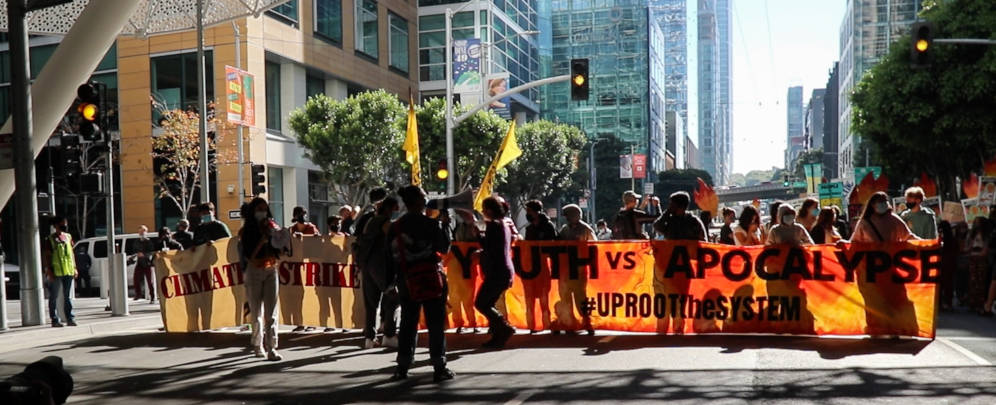


Members of Extinction Rebellion San Francisco Bay Area and Silicon Valley Climate Action Now blockaded the front entrance to BlackRock with a human chain and ‘lock box’ tubes. Copyright: Peg Hunter, (CC BY-NC 2.0)
The UN Framework Convention on Climate Change has released a report analysing the national climate strategies that were submitted before August. They received 164 nationally determined contributions (NDCs) from the 191 parties to the Paris Agreement.
The report says that the total global greenhouse gas emission level “implies possibility of global emissions peaking before 2030, with the lower bound of the 2030 emission level … estimated to be up to 1.4 per cent below the 2019 emission level”.
But, the report goes on to say that even with full implementation of national strategies, the total global emission level in 2030 “is expected to be 16.3 per cent above the 2010 level”. And according to the Intergovernmental Panel On Climate Change, to keep warming within 1.5 degrees Celsius above pre-industrial levels, global carbon emissions need to decline by about 45 per cent from the 2010 level by 2030, and reach net zero by 2050.
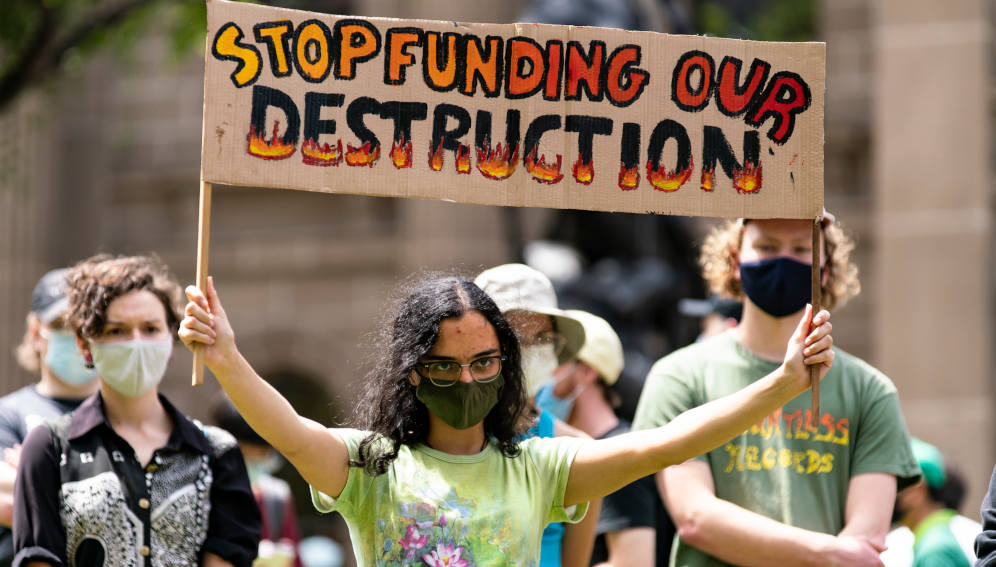


A protest called by Uni Students For Climate Justice in Melbourne, forming part of a COP26 Global Day of Action against climate inaction. Copyright: Matt Hrkac, (CC BY 2.0).
![]()
![]()
![]()
![]()
![]()
![]()
![]()
![]()
![]()
![]()
![]()
![]()
![]()
![]()
![]()
![]()
![]()
![]()
![]()
![]()
![]()
![]()
![]()
![]()
![]()
![]()
![]()
![]()
![]()
![]()
![]()
![]()
![]()
![]()
![]()
5 November 4:00pm
Live updates on the best science and development news from the COP26 climate talks in Glasgow, UK.
More than 50,000 people could converge on Glasgow tomorrow, as part of the Global Day of Action. They will join scores of other events across the world, including protests at ten UK airports.
Saturday’s COP26 meetings will be focused on nature and land use, and ensuring that they are part of global action on climate change.
They come after indigenous peoples’ representatives warned that so-called nature-based solutions to climate change – where farming techniques are used to rein in CO2 emissions – have the potential to harm communities where solutions are planned on their lands. At a late-evening panel on Thursday (4 November), indigenous leaders said that 80 per cent of the world’s areas of highest biodiversity are concentrated on their territories.
Elsewhere at COP26, the focus remains on climate finance. Nafkote Dabi, climate change policy lead at Oxfam, said it was “shameful” that the US$100 billion in climate finance promised in 2009 had not been delivered. But, she said this was “a political goal” and not based on the needs of communities in developing and climate change-affected countries.
Sunday will be a rest day for negotiators and observers, ahead of what is expected to be a “rough” second week, according to Jennifer Morgan, executive director at Greenpeace International.
![]()
![]()
![]()
![]()
![]()
![]()
![]()
![]()
![]()
![]()
![]()
![]()
![]()
![]()
![]()
![]()
![]()
![]()
![]()
![]()
![]()
![]()
![]()
![]()
![]()
![]()
![]()
![]()
![]()
![]()
![]()
![]()
![]()
![]()
![]()
5 November 9:30am
Live updates on the best science and development news from the COP26 climate talks in Glasgow, UK.
Today’s theme at COP26 is youth and public empowerment, which aims to elevate the voices of young people and demonstrate the role of public empowerment and education in climate action.
While country delegates within the sheltered Blue Zone may be able to avoid hearing their voices, it is expected that up to 10,000 people will march across Glasgow, host of the COP26 summit, as part of youth and empowerment day.
The Loss and Damage Youth Coalition has taken one climate change convention mechanism to school, and graded it a “fail”.
The coalition says the Warsaw International Mechanism for Loss and Damage – known as WIM – has fundamentally failed in its mandate to address loss and damage associated with impacts of climate change.
WIM was established at COP19 in Warsaw, Poland and its focus is on creating comprehensive risk management approaches, cooperation on climate displacement and migration, and action on finance.
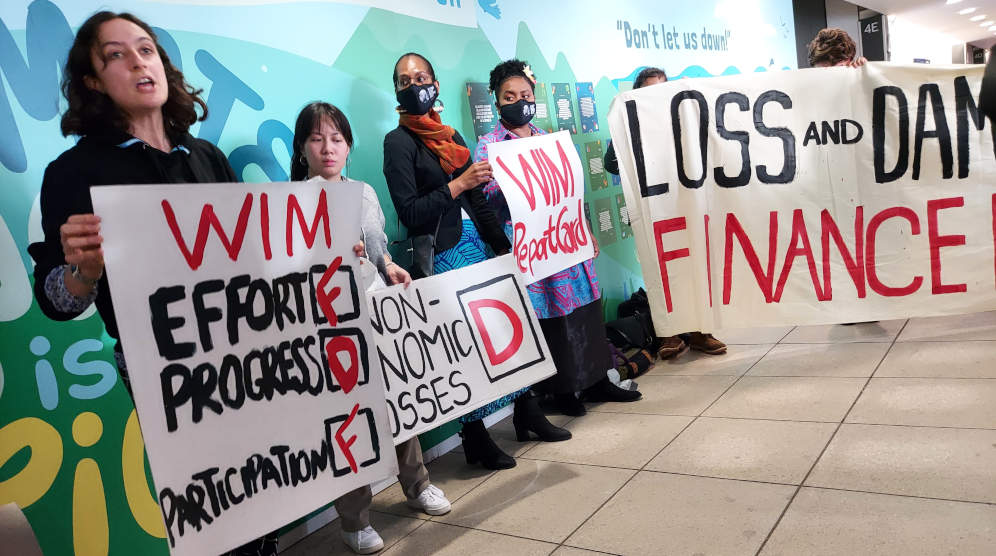


The loss and damage youth coalition, giving their report card on WIM. Copyright: Fiona Broom / SciDev.Net
“We find that the [executive committee] has made little to no progress or effort to enhance action and support to address slow onset loss and damage. For this reason, we give the WIM a grade of ‘D’ for its progress on slow onset events,” said the Philippines’ Jefferson Estela.
“But the WIM can improve by using the Santiago Network to develop pilot initiatives that can help slow onset events on the ground.”
The Santiago Network aims to catalyse technical assistance to avoid or address loss and damage – the impacts of climate change that can’t be mitigated or adapted to – in the developing countries that are particularly vulnerable.
Vicky Tauli-Corpuz, the former UN special rapporteur on the rights of Indigenous peoples,
yesterday described loss and damage as: “Damage that has happened already and you can never adapt anymore because your island has sunk.”
BIG NEWS ???? #COP26 climate pledges mean Glasgow is getting closer to Paris!
New @IEA analysis shows that fully achieving all net zero pledges to date & the Global Methane Pledge by those who signed it would limit global warming to 1.8 C
A big step forward, but much more needed!
— Fatih Birol (@fbirol) November 4, 2021
The head of the International Energy Agency, Fatih Birol, yesterday announced that “fully achieving all net zero pledges to date and the Global Methane Pledge by those who signed it would limit global warming to 1.8 C”.
But Selwin Hart, the UN’s assistant secretary-general for climate change, said that the war was not yet won.
“The fight to keep 1.5 [degrees Celsius] goal alive is far from over,” Hart said. “Today I urged the [Powering Past Coal Alliance] to continue the good fight to end coal and accelerate the just and fair energy transition. We cannot become complacent. This is a fight we can’t afford to lose.”
![]()
![]()
![]()
![]()
![]()
![]()
![]()
![]()
![]()
![]()
![]()
![]()
![]()
![]()
![]()
![]()
![]()
![]()
![]()
![]()
![]()
![]()
![]()
![]()
![]()
![]()
![]()
![]()
![]()
![]()
![]()
![]()
![]()
![]()
![]()
4 November 3:30pm
Live updates on the best science and development news from the COP26 climate talks in Glasgow, UK.
Twenty countries and five international finance institutions have today pledged to end fossil fuel finance by the end of 2022. These are primarily wealthy countries, but the list does include some developing countries that are recipients of fossil finance.
“This is a historic commitment,” says Jean Su, energy justice programme director and senior attorney at the US-based Center for Biological Diversity. “Over the course of the last few years we’ve seen different countries commit to phasing out coal finance, but this is the first political commitment to phase out oil and gas finance as well.
“Among those signatories are the United States and Canada, two historic, highly financed countries who fuel coal, oil and gas. And we also have first movers like Costa Rica and Mali. And just ten minutes ago we had the European Commission sign on as well.”
The five development institutions include the European Investment Bank and the East African Development Bank.
“If implemented, this commitment will shift US$18 billion a year from fossil fuels to renewable energy. This is a very welcome development,” added Su.
That ‘if’ that Su mentions is the key sticking point here. Observers say that COP26 country delegations are pact-happy, but the question of whether these declarations materialise into action will remain until pledges are fulfilled.
Su also pointed out that difficulties faced by developing countries in securing finance for new energy projects that may be considered ‘high risk’ makes the pledge “woefully insufficient in and of itself”. The commitment only relates to new fossil fuel projects – existing projects can continue – and unabated fossil fuel projects are not included, she said.
“That means that carbon capture and storage and other fossil fuel projects that have some type of ‘technical fix’ are still allowed,” Su said. “It’s very similar to the false promises on net zero commitments by 2050.”
“At the same time though, if we want to give the benefit of the doubt, there is also a push for clean energy, especially clean energy manufacturing.”
Su said that these countries viewed domestic and international investments in clean energy technology as potential boons for their own economies.
![]()
![]()
![]()
![]()
![]()
![]()
![]()
![]()
![]()
![]()
![]()
![]()
![]()
![]()
![]()
![]()
![]()
![]()
![]()
![]()
![]()
![]()
![]()
![]()
![]()
![]()
![]()
![]()
![]()
![]()
![]()
![]()
![]()
![]()
![]()
4 November 12:30pm
Live updates on the best science and development news from the COP26 climate talks in Glasgow, UK.
It’s Energy Day at COP26, with coal power top of the agenda.
The UK government, hosting the UN climate summit in Glasgow, says 190 countries and organisations have signed a deal to phase out coal power and end support for new coal power plants.
Vietnam and Chile are among 18 countries making this commitment for the first time as they put their names to the new Global Coal to Clean Power Transition Statement.
The statement commits the world’s major economies to phasing out coal in the next 20 years, and the rest of the world to doing so in the next 30 years. Countries must also rapidly scale up deployment of clean power generation as part of the deal, and ensure the transition from coal benefits communities, the UK government says.
The UK’s minister for Africa, Vicky Ford, says transition to clean energy will create hundreds of thousands of green jobs across the developing world. We’ll bring you reaction to this later in the day.
At yesterday’s finance meetings, Indonesian finance minister Sri Mulyani Indrawati said that replacing coal in Indonesia would require massive infrastructure projects, making the role of long-term financial support critical. Indrawati estimated it would cost US$270 billion just to meet Indonesia’s commitments under their national climate plan, but that would not take the country to net zero.
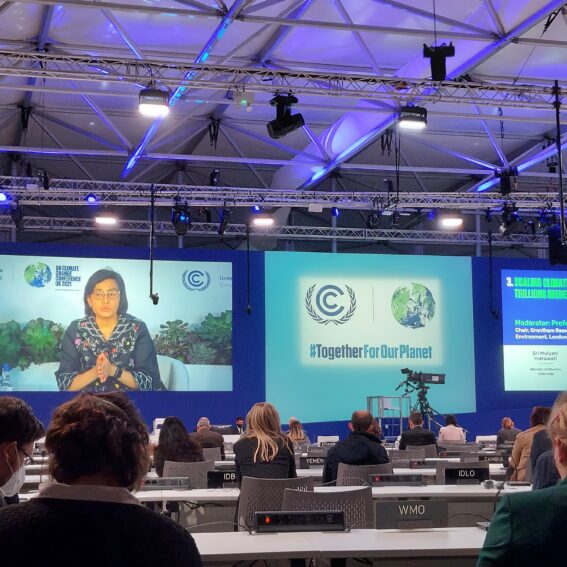


Indonesian finance minister Sri Mulyani Indrawati.
It is expected that Indonesia could announce plans to bring forward its coal deadline, from 2056 to 2040, with financial support.
Among the finance commitments so far this week, $10 billion of philanthropy-led financing has been pledged to support developing countries deploy clean power under the Global Energy Alliance for People and Planet, plus $8.5 billion for the South Africa Just Energy Transition Partnership, according to the UK government. It says the Philippines has also agreed a new partnership with the Asian Development Bank to support the early retirement of existing coal plants.
Further financing announcements are expected today.
The Powering Past Coal Alliance is hosting a mainstage event later today to showcase new commitments to end coal power generation by governments and businesses. Discussion will include the important role of non-state actors in driving the transition from coal to clean energy. The alliance, formed in 2017, is a coalition of national and sub-national governments, businesses and organisations working to advance the transition from unabated coal power generation to clean energy.
Indigenous raise finance concerns
Indigenous groups from Brazil gathered at the indigenous peoples’ pavilion yesterday (Wednesday) to voice their concerns about climate change financing. They said it would be useless to have more funds if the bureaucracy that hinders international resources from reaching indigenous organisations is not broken down.
“Actions to mitigate climate impacts in Brazil have not been implemented due to a lack of resources and will on the part of the Brazilian government,” said indigenous representative Marcos Avilquis Campos.
At the event, Torbjorn Gjefsen, of Rainforest Foundation Norway, spoke about the Falling Short Report, an assessment his foundation made of the forest management funding that has been dedicated to indigenous groups and local communities.
“Between 2011 and 2020, these groups received approximately $2.7 billion from bilateral and multilateral donors as well as private philanthropies,” Gjefsen said. That represents less than one per cent of mitigation and adaptation funding.
Don’t forget the farmers
Farmers, scientists and representatives of farmers’ organisations also participated in a panel at COP26 yesterday to present a guide for public policies in the agricultural sector.
“The first COPs did not even include farmers,” said Theo De Jager, president of the World Farmers’ Organisation. Since then, he says, the agricultural sector has struggled to have a seat in the climate discussions. It has been judged as if it were the same as the hydrocarbon sector, when in fact “farmers are not part of the problem, we are part of the solution”, he said.
For that solution to be realised there must be public policies that include farmers from the ground up, said De Jager, adding: “Invite us to the kitchen of climate solutions.”
Colombian Ana María Loboguerrero, head of global policy research at the CGIAR Research Program for Climate Change, Agriculture and Food Security (CCAFS), presented a toolkit for implementing policies that include the living conditions and perspectives of farmers.
“We need public policies that put farmers at the centre. If they don’t, they will fail,” said Loboguerrero.
![]()
![]()
![]()
![]()
![]()
![]()
![]()
![]()
![]()
![]()
![]()
![]()
![]()
![]()
![]()
![]()
![]()
![]()
![]()
![]()
![]()
![]()
![]()
![]()
![]()
![]()
![]()
![]()
![]()
![]()
![]()
![]()
![]()
![]()
![]()
3 November 8:00pm
Live updates on the best science and development news from the COP26 climate talks in Glasgow, UK.
Finance ministers met Wednesday to consider ways to deliver the promised US$100 billion in climate finance – the unfulfilled pledge made at the UN climate summit in Copenhagen 12 years ago.
A new assessment report of the flow of climate finance showed that countries seeking to access finance for adaptation, mitigation and renewable energy were struggling to do so.
Seyni Nafo, co-facilitator of the finance standing committee for the UN Framework Convention on Climate Change, said that the review – which was due to be delivered last year but stalled due to the pandemic – found that access to finance was a key challenge. He said more work would be done to identify ways to bridge the access gaps.
On the positive side, the report also found decreases in the cost of renewable energy technologies meant that more power could be delivered for much lower costs than five years ago.



Seyni Nafo, co-facilitator of the finance standing committee for the UN Framework Convention on Climate Change, during the plenary at COP26.
The ‘F’ words
On the sidelines of the main talks, Catherine Abreu, the founder and executive director at Canadian non-profit Destination Zero, said that for 30 years countries had been turning up at COP meetings and claiming climate leadership, while continuing to produce coal, oil and gas at home. She said that the UN’s Framework Convention on Climate Change did not mention fossil fuels and the 2015 Paris Agreement did not contain the words ‘coal’, ‘oil’ or ‘gas’.
“We won’t keep 1.5 alive if we don’t bring fossil fuels into the negotiating rooms at COP26,” Abreu said, referring to the Paris goal for limiting warming to 1.5 degrees compared to pre-industrial levels.
“Fortunately, we have seen that parties are finally saying the ‘F’ words here, with least-developed countries in their opening statements on Sunday night demanding a just, equitable phase-out of fossil fuels from developed countries, along with an end to fossil fuel financing, and a long list of energy-related pacts and alliances emerging between governments over the course of the next few days.
“Unfortunately, many of these pacts are being undermined by missing the boat on addressing the need for a just and managed decline of fossil fuel production.
“A decision from COP26 must include a direct commitment to phasing out fossil fuels – it’s not good enough for the energy transition and fossil fuel production to remain a sub-text of these conversations.”
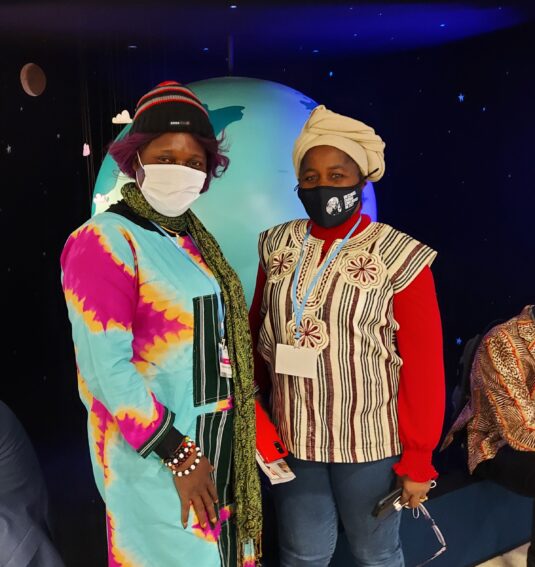


Journalists Christiana Winnie Saywah (left) and Siatta Scott Johnson (right) are experiencing the COP from within this year, attending as delegates for their country, Liberia. As members of the Female Journalists Association of Liberia, Saywah and Johnson are focused on gender.
![]()
![]()
![]()
![]()
![]()
![]()
![]()
![]()
![]()
![]()
![]()
![]()
![]()
![]()
![]()
![]()
![]()
![]()
![]()
![]()
![]()
![]()
![]()
![]()
![]()
![]()
![]()
![]()
![]()
![]()
![]()
![]()
![]()
![]()
![]()
3 November 8:30am
Live updates on the best science and development news from the COP26 climate talks in Glasgow, UK.
With the world leaders now departed, negotiations are ramping up.
Finance is the theme of the day and wrangling will continue over how to achieve the promised US$100 billion per year for adaptation, mitigation, knowledge transfer and a transition to renewable energy for lower-income countries.
The Standing Committee on Finance will also launch its first report on the determination of the needs of developing countries, related to implementing the climate change convention and the Paris Agreement.
.@ExtinctionR has blocked the entrance of #COP26 and who cares if I can't get inside for my next event because I AM IN SOLIDARITY pic.twitter.com/svsXhquQ9q
— Alexandria Villaseñor is at COP26! (@AlexandriaV2005) November 2, 2021
‘Breakthrough’ Agenda
The UK Presidency yesterday launched what it’s calling the Breakthrough Agenda – a commitment endorsed by 42 states to accelerate the development and deployment of clean technologies and sustainable solutions by 2030.
British prime minister Boris Johnson set out the first five goals – what are being called the Glasgow Breakthroughs – relating to power, road transport, steel, hydrogen and agriculture, which collectively cover more than 50 per cent of global emissions. State that have endorsed the agenda include Turkey, Kenya, India, China and Egypt.
To support the breakthrough intentions, from next year ministers will be “invited” to review global progress, informed by an annual report led by the International Energy Agency, and working in collaboration with the International Renewable Energy Agency (IRENA).
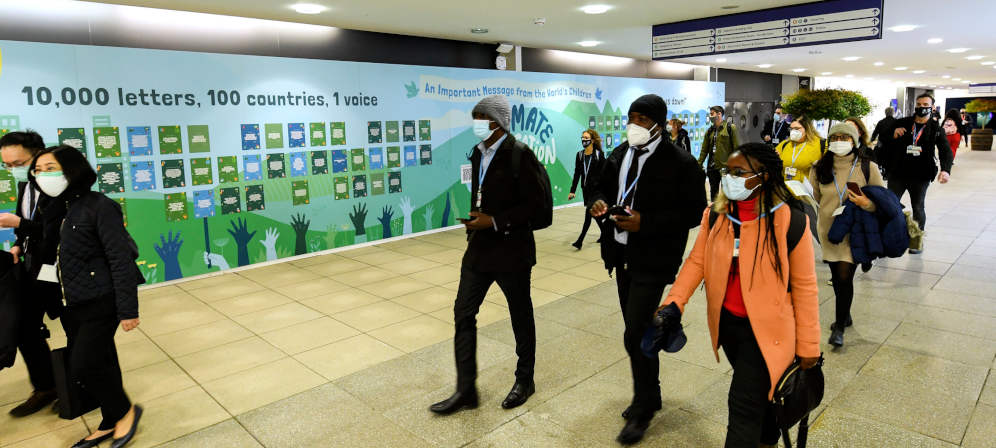


Delegates walking past a wall of children’s letters on the concourse of the SEC at COP26. Copyright: Doug Peters/UK Government, (CC BY-NC-ND 2.0).
![]()
![]()
![]()
![]()
![]()
![]()
![]()
![]()
![]()
![]()
![]()
![]()
![]()
![]()
![]()
![]()
![]()
![]()
![]()
![]()
![]()
![]()
![]()
![]()
![]()
![]()
![]()
![]()
![]()
![]()
![]()
![]()
![]()
![]()
![]()
2 November 4:00pm
Live updates on the best science and development news from the COP26 climate talks in Glasgow, UK.
Another pledge has come out at COP26 today, this time relating to methane emissions. More than 100 countries signed the Global Methane Pledge, under which signatories commit to reduce methane emissions by at least 30 per cent by 2030, relative to 2020 levels.
Methane is released through burning fossil fuels, coal mining, agriculture and some industrial processes and is one of the most potent greenhouse gases. The pledge says that methane accounts for 17 per cent of global greenhouse gas emissions from human activities, and the energy sector has the greatest potential for reductions.
The signatories, which represent 70 per cent of the global economy, include agricultural powerhouses Brazil, the United States and Europe, as well as Argentina, Ethiopia and Pakistan.
Helen Mountford, climate and economics vice president at the non-profit World Resources Institute, said the pledge set a “strong floor in terms of the ambition we need globally”.
She explained rapid action to cut methane emissions would limit near-term warming and curb air pollution, improve food security and lead to better public health.
Forests
The Glasgow Leaders’ Declaration on Forests and Land Use commits signatories to work collectively to halt and reverse forest loss and land degradation by 2030, while delivering sustainable development and promoting an inclusive rural transformation.
“We urge all leaders to join forces in a sustainable land use transition,” the declaration says.
“This is essential to meeting the Paris Agreement goals, including reducing vulnerability to the impacts of climate change and holding the increase in the global average temperature to well below two degrees Celsius and pursuing efforts to limit it to 1.5 [degrees Celsius], noting that the science shows further acceleration of efforts is needed if we are to collectively keep 1.5 [degrees Celsius] within reach.”
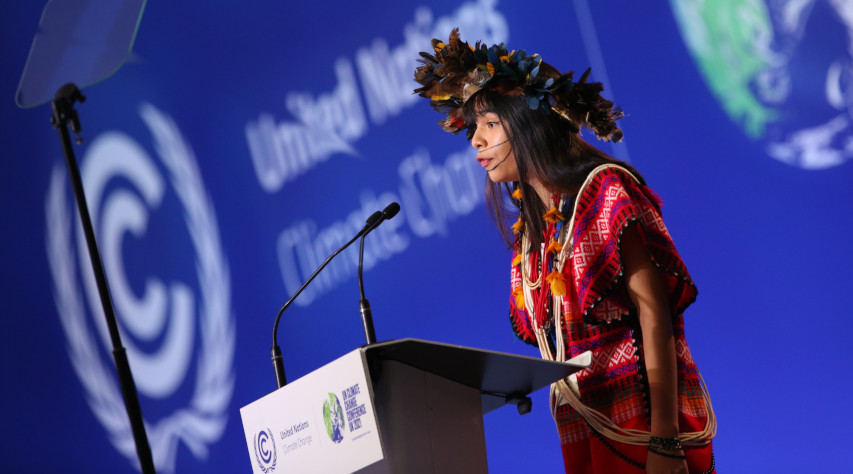


A speaker dressed in traditional attire at COP26. More than 100 countries have signed the Global Methane Pledge. Copyright: UNclimatechange. (CC BY-NC-SA 2.0).
Alexandre Antonelli, director of science at the UK’s Royal Botanic Gardens, Kew, said that while the commitment was welcome, there were concerns about how the pledge would play out in reality.
“Halting deforestation has been promised before but failed hugely,” Antonelli said.
“We can’t afford repeating that – two in five plant species now face extinction – this is our last window of opportunity. What we need now is delivery, and enough details to hold our leaders to account.”
He said that any reforestation plans must follow best scientific practice to plant the right tree in the right place.
“Protection must start with the most biologically valuable ecosystems such as the Brazilian rainforests,” Antonelli said.
“Climate action without climate justice, is I think morally and technically bankrupt” – @dhnnjyn of @oxfamgb gives a final address to our #GlasgowClimateDialogues panel.https://t.co/ZZbGCtlU6p pic.twitter.com/0pwdBVzvl4
— Stop Climate Chaos Scotland (@sccscot) November 2, 2021
Danny Sriskandarajah, chief executive at Oxfam GB, also cautioned that tree planting schemes were not a solution to climate change.
Outside a Glasgow Climate Dialogues event at the UK pavilion, he said that a recent Oxfam study estimated that using land to absorb the emissions of countries and companies that have pledged to become ‘net zero’ – that’s the balance between the amount of greenhouse gases released and the amount removed – would require up to 1.6 billion hectares of new forest.
“Even if we could come close to that, the impacts on food prices and food security [would be] disastrous,” Sriskandarajah said. “It’s another reminder of how climate action without climate justice, without [recognition of] loss and damage [to countries as a result of climate change], without proper climate finance is just not plausible.
“It’s morally wrong and technically bankrupt.”
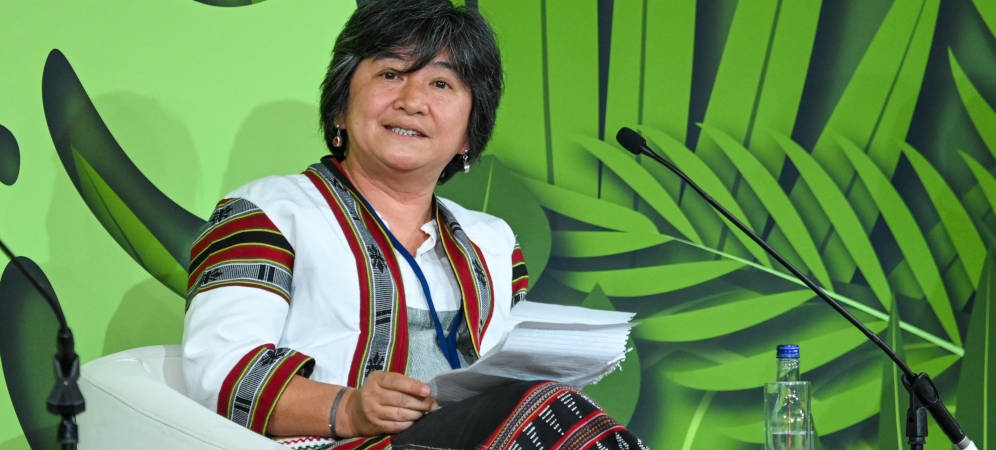


Joan Carling, member of Indigenous Peoples’ Major Group, speaking at the Forest event. Copyright: Karwai Tang/UK Government. (CC BY-NC-ND 2.0).
India and China
India has not yet signed up to the either the forests declaration or the methane reduction pledge, despite committing yesterday (Monday) to reduce greenhouse emissions over the next 50 years.
India’s pledge to achieve net zero carbon emissions by 2070 has been met with surprise by some.
Ritu Bharadwaj, climate governance and finance researcher at the International Institute for Environment and Development, said she had not expected the announcement, given India’s government had been resistant to decarbonising its economy.
She said the extended timeline – 20 years beyond many other countries’ commitments – was reasonable for a country where so many people still lived in extreme poverty.
“India at least needs two additional decades compared to its developed country counterparts to deal with the development backlog left behind by centuries of colonisation,” Bharadwaj said.
“India will need space to provide its poor population with reliable electricity … accessible roads, decent shelter.”
China has not signed up to the methane pledge, but it has committed to conserve forests and other ecosystems and accelerate their restoration under the forests and land use declaration. This declaration also includes a collective commitment to incentivise sustainable agriculture and redesign agricultural policies as necessary.
![]()
![]()
![]()
![]()
![]()
![]()
![]()
![]()
![]()
![]()
![]()
![]()
![]()
![]()
![]()
![]()
![]()
![]()
![]()
![]()
![]()
![]()
![]()
![]()
![]()
![]()
![]()
![]()
![]()
![]()
![]()
![]()
![]()
![]()
![]()
2 November 9:00am
Live updates on the best science and development news from the COP26 climate talks in Glasgow, UK.
COP26 will see its first major deal reached today with more than 100 leaders representing 85 per cent of the world’s forests agreeing to end deforestation by 2030.
“With this pledge, we have a chance to end humanity’s long history as nature’s conqueror, and become its custodian,” tweeted British prime minister Boris Johnson, hosting the UN summit in Glasgow.
Forests are the lungs of our planet.
Today @COP26, over 100 leaders representing 85% of the world’s forests will take landmark action to end deforestation by 2030.
With this pledge, we have a chance to end humanity’s long history as nature’s conqueror, and become its custodian.
— Boris Johnson (@BorisJohnson) November 2, 2021
Countries including Brazil, Indonesia and the Democratic Republic of Congo are expected to sign the pledge.
Statements from world leaders at the high-level segment for heads of state and government will also continue throughout the day, on the final day of the World Leaders Summit.
Statements delivered yesterday by political leaders of developing countries suggest that their delegations at the UN summit will continue banging the drum for ambitious emissions reductions plans and equitable finance to support vulnerable states.
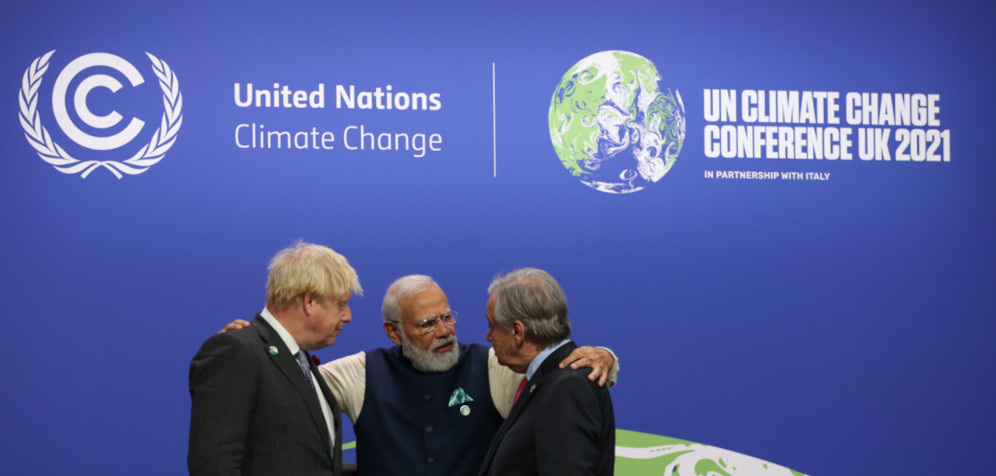


UK and India prime ministers Boris Johnson and Narendra Modi talking to UN secretary general António Guterres. Copyright: UNclimatechange, (CC BY-NC-SA 2.0).
With many invoking cultural sayings relating to unity and hope, the presidents and prime ministers urged wealthy countries to make good on their unfulfilled promises of US$100 billion in climate finance made at Copenhagen in 2009.
Prime Minister of Barbados Mia Mottley described the failure to deliver on finance to support the transition to renewable energies and climate adaptation and mitigation as “immoral and unjust” and said two degrees of warming was a “death sentence” for vulnerable communities.
Lesotho’s prime minister Moeketsi Majoro said that local science had a role to play in combatting greenhouse gas emissions and global warming. He said research centres should be strengthened and supported, both financially and with technology.
Sheikh Hasina, prime minister of Bangladesh, also issued a demand for the transfer of technology and knowledge to support adaptation in countries living with climate impacts, such as sea level rise. She called for equal contributions to adaptation and mitigation from climate finance, a focus on loss and damage linked to extreme weather events, and a “climate emergency pact”.
Controversy followed the statement from Indian prime minister Narendra Modi. He said that his country – one of the world’s largest emitters of greenhouse gases – would aim to become net zero by 2070, 20 years later than the target set by the UK as COP26 host. Some praised Modi’s commitment to reducing carbon, while others said it would be too little too late.
Uhuru Kenyatta, president of Kenya, said his country plans to achieve 100 per cent renewable energy by 2030 – one of the few references to alternative energy sources that came from the world leaders yesterday.
Honduran president Juan Orlando Hernández said recent climate change-induced extreme weather had cost the central American country more than nine per cent of its gross domestic product, and in exchange he expected “a pittance” from the negotiations.
![]()
![]()
![]()
![]()
![]()
![]()
![]()
1 November 14:30pm
Live updates on the best science and development news from the COP26 climate talks in Glasgow, UK.
Part one of the high-level segment for heads of state and government is kicking off now. Leaders will deliver national statements today and tomorrow, and we’ll bring you highlights from addresses from global South leaders.
UN secretary-general António Guterres told the summit: “We need maximum ambition – from all countries on all fronts – to make Glasgow a success.
“I urge developed countries and emerging economies to build coalitions to create the financial and technological conditions to accelerate the decarbonisation of the economy as well as the phase out of coal.
“Let’s have no illusions: if commitments fall short by the end of this COP, countries must revisit their national climate plans and policies. Not every five years. Every year.”
The first part of the workshop on gender and climate change wrapped up earlier in the day, ahead of Gender Day on 9 November. Significantly, just four of the political leaders due to deliver a national statement today are women. These are Bangladeshi prime minister Sheikh Hasina, president of the European Commission Ursula von der Leyen, outgoing German chancellor Angela Merkel, and Estonian prime minister Kaja Kallas.
Tomorrow (Tuesday) won’t fare much better for gender balance. Addresses are expected from Tanzania’s new president, Samia Suluhu Hassan, Barbadian prime minister Mia Amor Mottley, Slovakian president Zuzana Čaputová and Icelandic prime minister Katrin Jakobsdottir.
![]()
![]()
![]()
![]()
![]()
![]()
![]()
![]()
![]()
![]()
![]()
![]()
![]()
![]()
![]()
![]()
![]()
![]()
![]()
![]()
![]()
![]()
![]()
![]()
![]()
![]()
![]()
![]()
![]()
![]()
![]()
![]()
![]()
![]()
![]()
1 November 14:30pm
Live updates on the best science and development news from the COP26 climate talks in Glasgow, UK.
Part one of the high-level segment for heads of state and government is kicking off now. Leaders will deliver national statements today and tomorrow, and we’ll bring you highlights from addresses from global South leaders.
UN secretary-general António Guterres told the summit: “We need maximum ambition – from all countries on all fronts – to make Glasgow a success.
“I urge developed countries and emerging economies to build coalitions to create the financial and technological conditions to accelerate the decarbonisation of the economy as well as the phase out of coal.
“Let’s have no illusions: if commitments fall short by the end of this COP, countries must revisit their national climate plans and policies. Not every five years. Every year.”
The first part of the workshop on gender and climate change wrapped up earlier in the day, ahead of Gender Day on 9 November. Significantly, just four of the political leaders due to deliver a national statement today are women. These are Bangladeshi prime minister Sheikh Hasina, president of the European Commission Ursula von der Leyen, outgoing German chancellor Angela Merkel, and Estonian prime minister Kaja Kallas.
Tomorrow (Tuesday) won’t fare much better for gender balance. Addresses are expected from Tanzania’s new president, Samia Suluhu Hassan, Barbadian prime minister Mia Amor Mottley, Slovakian president Zuzana Čaputová and Icelandic prime minister Katrin Jakobsdottir.
![]()
![]()
![]()
![]()
![]()
![]()
![]()
1 November | 10:30am
Live updates on the best science and development news from the COP26 climate talks in Glasgow, UK.
Welcome to SciDev.Net’s live coverage from the COP26 climate summit in Glasgow. We’ll be bringing you regular updates on the most important news for the global South from these historic UN climate change negotiations.
The provisional State of the Global Climate 2021 report, released yesterday, indicates just how important these talks are. The World Meteorological Organization (WMO) says the seven years to 2021 are on track to be the warmest on record. Global sea level rise accelerated since 2013 to a new high this year, with continued ocean warming and acidification.
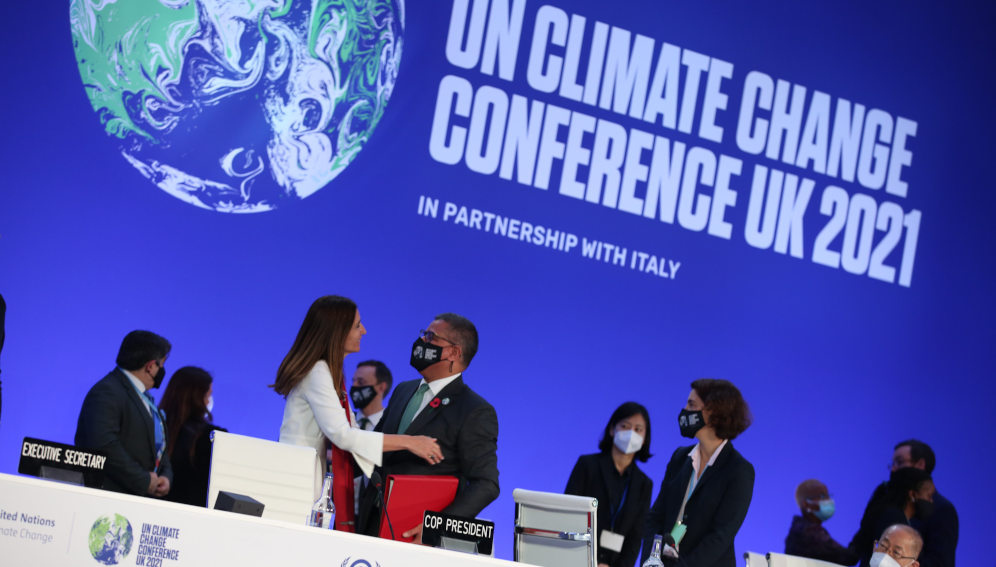


Delegates at the opening plenary of COP26 in Glasgow on 31 October. Copyright: UNclimatechange, (CC BY-NC-SA 2.0).
What does this mean for climate-vulnerable communities in the global South? We’ll find out as we talk to the representatives who have been able to make the journey to the United Kingdom.
Speaking of journeys, thousands of delegates are likely to be arriving late today to the Scottish Event Campus, which is playing host to the summit, as weather-related chaos on Britain’s rail networks left crowds stranded across the UK yesterday.
“Extreme events are the new norm,” said WMO secretary-general Petteri Taalas at the release of the report. “At the current rate of increase in greenhouse gas concentrations, we will see a temperature increase by the end of this century far in excess of the Paris Agreement targets of 1.5 to 2 degrees Celsius above pre-industrial levels.
“COP26 is a make-or-break opportunity to put us back on track.”
Events will kick off with a two-day world leaders summit including more than 100 heads of state or government — but without China and Russia.
Commitments made in 2015 under the Paris Agreement will be a major focus during the summit. A panel of global South climate specialists convened by SciDev.Net ahead of COP26 also said that finance for adaptation and mitigation, loss and damage associated with extreme weather events, and climate justice would be top of the agenda for developing country delegates and civil society.
At the official opening yesterday, the president of the United Nations General Assembly, Abdulla Shahid of the Maldives, issued a plea to COP26 country delegates and the international community not to forget small islands and other vulnerable and least-developed countries. “The message I will bring with me to COP … is that we are capable of overcoming climate change: we have the science, the resources, the public support,” said Shahid. “All we lack is the will. We can do this together.”
This piece was produced by SciDev.Net’s Global desk.
This liveblog is supported by funding from the Global Landscapes Forum (GLF)
![]()
![]()
![]()
![]()
![]()
![]()
![]()


